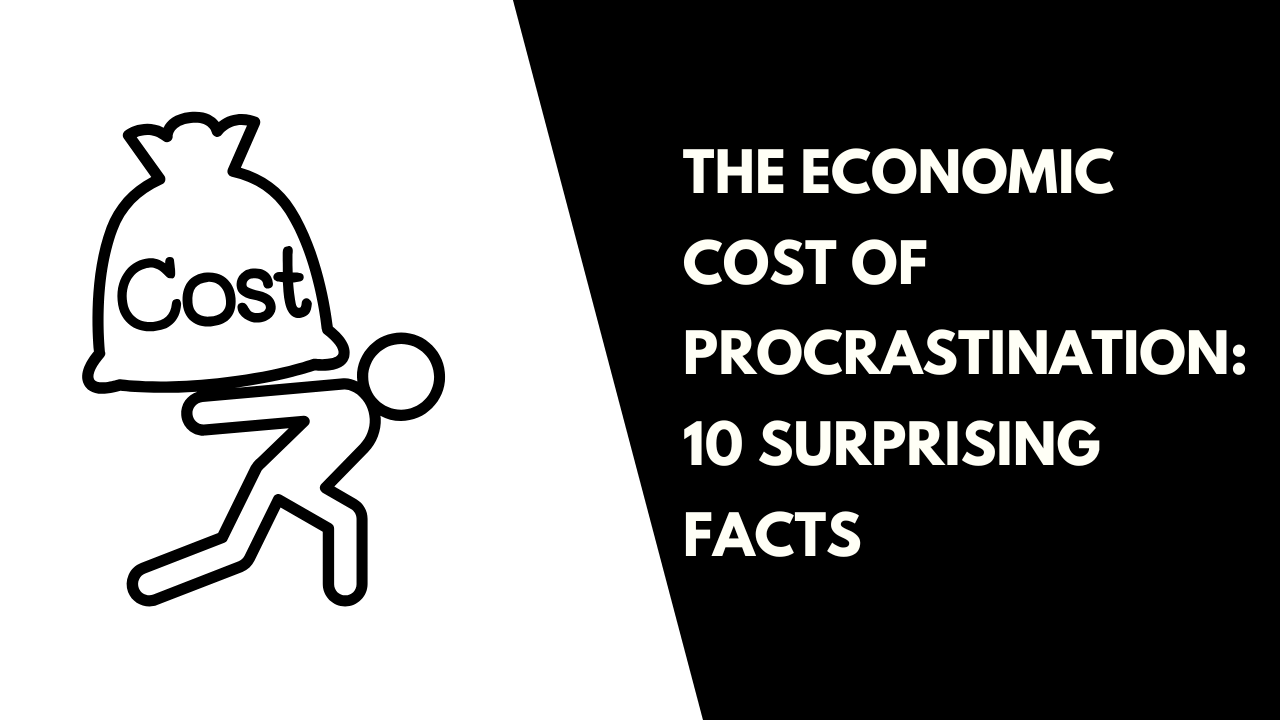The Economic Cost of Procrastination: 10 Surprising Facts
The Economic Cost of Procrastination: 10 Surprising Facts
Procrastination isn’t just a personal quirk or a harmless delay. It can have real, tangible effects on our financial well-being, professional growth, and even national economies. The Economic Cost of Procrastination is an often-overlooked aspect of this common habit, and understanding it can help us take the first step toward overcoming it. Let’s explore 10 surprising facts about how procrastination impacts our wallets, with examples and actionable insights to make meaningful changes.
Table of Contents
Toggle1. Lost Productivity at Work
Procrastination costs businesses billions of dollars annually due to lost productivity. A study by a leading consultancy firm revealed that an average employee spends about two hours daily on non-work-related activities, translating to significant economic losses for companies.
Example: Imagine a team of 10 employees earning $25/hour. If each procrastinates for two hours daily, the company loses $500 a day—that’s $130,000 a year!
Actionable Insight: Use productivity tools like time trackers or adopt techniques like the Pomodoro Technique to break tasks into manageable chunks and stay focused.
2. Delayed Career Growth
The Economic Cost of Procrastination also manifests in career stagnation. Delaying tasks like updating your resume, applying for promotions, or pursuing certifications can lead to missed opportunities.
Example: A marketing professional postpones learning new analytics tools. When a data-driven role opens, they lose the opportunity to someone more prepared.
Actionable Insight: Set micro-goals with deadlines. For example, commit to updating your resume by the weekend or completing an online course within a month.
3. Higher Debt Due to Missed Deadlines
Procrastination can lead to missed bill payments, resulting in late fees and higher interest rates, significantly impacting personal finances.
Example: Failing to pay a credit card bill on time incurs a late fee of $30 and increases the annual interest rate, compounding over time.
Actionable Insight: Automate your payments or set calendar reminders to avoid unnecessary financial penalties.
4. Health-Related Financial Costs
Delaying regular health check-ups or ignoring symptoms can lead to more severe and expensive medical conditions.
Example: A person avoids a dentist appointment for minor tooth pain. Months later, they require a root canal, costing hundreds or thousands of dollars.
Actionable Insight: Schedule preventive health check-ups annually and address medical concerns promptly to save money and improve well-being.
5. Lost Opportunities in Investments
Delaying financial planning or investing can lead to missed opportunities for wealth accumulation. The power of compound interest diminishes the longer you wait.
Example: If you procrastinate investing $1,000 annually for 10 years, at a 7% return, you lose out on almost $70,000 in 30 years compared to starting early.
Actionable Insight: Start small, even if it’s just $50 a month. Platforms like robo-advisors make investing accessible and less intimidating.
6. Business Failures Due to Inaction
Entrepreneurs often face the Economic Cost of Procrastination by delaying critical decisions or market entries. This can result in missed opportunities and loss of competitive advantage.
Example: A startup delays launching a product due to perfectionism, only to find that a competitor has captured the market.
Actionable Insight: Embrace the Minimum Viable Product (MVP) approach to test ideas quickly and refine them based on feedback.
7. Strained Relationships and Financial Fallout
Procrastination in addressing financial issues with partners can strain relationships and lead to costly disputes.
Example: A couple delays discussing budgeting, leading to overspending and eventual arguments about mounting debt.
Actionable Insight: Schedule regular financial check-ins to align on goals and tackle issues collaboratively.
8. Impact on National Economies
On a larger scale, the Economic Cost of Procrastination affects entire economies. Delays in implementing policies, infrastructure projects, or reforms can lead to inefficiencies and lost growth potential.
Example: A delayed transportation project increases construction costs and limits economic benefits like job creation and improved connectivity.
Actionable Insight: Advocate for accountability in governance and actively participate in public discussions to push for timely actions.
9. Educational and Skill Deficits
Students and professionals who procrastinate on learning miss out on acquiring essential skills, reducing their earning potential over time.
Example: A student procrastinates on preparing for exams, leading to lower grades and fewer scholarship opportunities.
Actionable Insight: Break study sessions into 25-minute intervals, followed by short breaks, to maintain focus and reduce overwhelm.
10. Emotional Stress Leading to Financial Strain
The guilt and stress caused by procrastination can lead to impulsive decisions, such as retail therapy, which further strains finances.
Example: Feeling overwhelmed by delayed tasks, someone splurges on expensive items to cope, only to regret it later when the credit card bill arrives.
Actionable Insight: Practice mindfulness or journaling to manage stress and make thoughtful financial decisions.
Overcoming the Economic Cost of Procrastination
Now that we’ve explored how procrastination impacts finances and the economy, here are some universal strategies to combat it:
Establish SMART Goals: Specific, Measurable, Achievable, Relevant, and Time-bound objectives offer clarity and drive motivation.
Prioritize Tasks: Use tools like the Eisenhower Matrix to differentiate between urgent and important tasks.
Accountability Partners: Share your goals with someone who can hold you accountable.
Reward Yourself: Celebrate small wins to stay motivated.
Reflect on Consequences: Remind yourself of the Economic Cost of Procrastination to stay focused.
Final Thoughts
Procrastination is more than just a harmless delay; it’s a habit that can have profound financial and economic repercussions. By recognizing the Economic Cost of Procrastination and adopting practical strategies, we can reclaim lost opportunities, improve our finances, and contribute to personal and societal growth. Start today—because the cost of waiting is often far greater than the effort required to act now.
“Stop postponing your dreams! From Delay to Done is your ultimate guide to conquering procrastination. Grab your copy today on Amazon!



